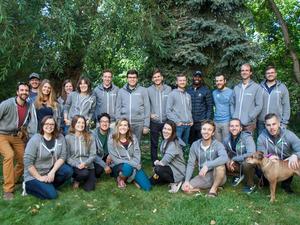
The Denver startup Honest Jobs landed a contract to help formerly incarcerated Coloradans find employment.
Honest Jobs, an early-stage startup that relocated in 2021 from Columbus, Ohio, to Denver, will work to implement Attorney General Phil Weiser's Fair Chance Hiring Initiative, a $1.1 million program to bolster job options for people leaving Colorado's prison system. According to Weiser's office, 8,500 people leave Colorado prisons each year, and many of them struggle to find employment.
“The partnership with Honest Jobs is an important step in building a fair-chance hiring ecosystem in Colorado,” Weiser said in a statement. “Helping employers connect to a talent pipeline of justice-involved individuals creates safer communities and a more vibrant economy that benefits us all.”
Honest Jobs operates a digital hiring platform specifically for formerly incarcerated people. So far, it's used by 1,300 companies, including 150 Colorado-based businesses and well-known brands, such as Wayfair, GAP, The Coca-Cola Company, PepsiCo, Koch Industries and Amazon.
The partnership with Colorado is Honest Jobs' first step into the public sector, said founder and CEO Harley Blakeman. Blakeman plans to use his startup's work with Colorado to gain traction in other states. He's already in talks with two other states about adopting the technology.
"Colorado is the first state to do this," Blakeman said. "We plan to deliver a high-quality experience, and we're excited because we think other states will follow Colorado's lead."
Honest Jobs created a separate platform for the Fair Chance Hiring Initiative, where job seekers in Colorado can log in to find employment opportunities. By establishing a separate website, Honest Jobs will be able to keep Colorado's data apart from the rest of its platform. That data — including the number of job seekers and offers and types of employment — will be shared with the state.
Honest Jobs plans to analyze the data and send insights to the state government, Blakeman said. For example, those insights could help the state learn what kinds of education would help formerly incarcerated people land jobs, he said.
"Historically, states blow millions of dollars on resources for criminal justice, but they never get any data," Blakeman said. "We're going to be able to make Colorado a much more savvy decision-maker when it comes to public safety, incarceration and reentry."
The platform offers a couple of unique insights for job seekers. On each job posting, Honest Jobs publishes the number of formerly incarcerated people the company has hired in the past. Honest Jobs also asks for job seekers' criminal history and — without disclosing that information — uses an algorithm to predict how likely they are to pass each company's background check.
The purpose is to help job seekers focus their time and efforts on companies where they're most likely to get a job, Blakeman said. According to a 2022 report by the Bureau of Justice Statistics, it took an average of six months for formerly incarcerated people to find their first job after release. Through Honest Jobs, they're able to secure employment in 24 days on average, Blakeman said.
Companies using Honest Jobs also appreciate those features because of the costs of taking job seekers through the hiring process and running background checks, only to learn they can't offer them jobs.
"With our system, [job seekers are] able to see, for example, there are 50 jobs in Fort Collins, and here are the four they have the best chance of getting hired for, and they apply for those first," Blakeman said. "This is why people are getting hired seven to eight times faster."
Blakeman was motivated to start Honest Jobs after enduring a tough job-seeking experience himself. Blakeman grew up in Florida and became homeless at age 15. He dropped out of high school and was imprisoned at 19 on a drug-related charge.
After a 14-month prison sentence — during which he earned his GED — Blakeman was admitted into Ohio State University. He worked and studied his way to being in the top 5% of his class, but despite graduating with good grades, his incarceration prevented him from landing a job.
"I interviewed with 100 companies and got rejected 100 times," Blakeman said. "I'm a white male with a college degree, an 800 credit score and three letters of recommendation, and even with all those advantages and privileges, I couldn't find a job. There are 19 million Americans with felonies, and 99.9% of them have it worse than I did."
Blakeman started Honest Jobs in Columbus and moved its headquarters to Colorado after participating in the 2020 class of the Techstars Workforce Development Accelerator Program, which is based in Denver. Around that time, Honest Jobs secured seed funding from Boulder-based venture capital firms Caruso Ventures and Matchstick Ventures.
Honest Jobs has an office inside Enterprise Coworking Rino and has 11 employees on staff. Blakeman said the startup might be looking to hire for more positions in the next few months.









